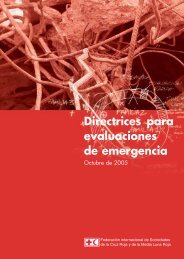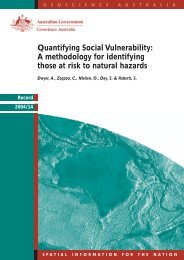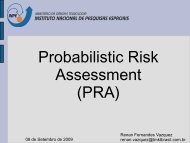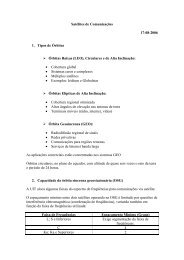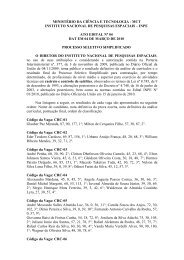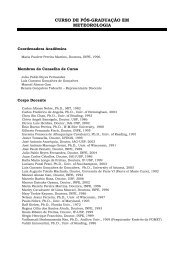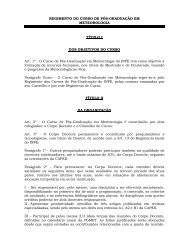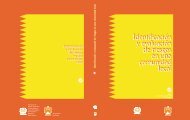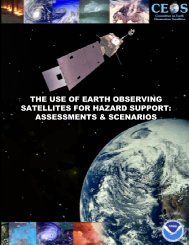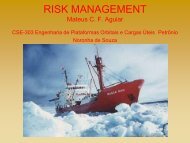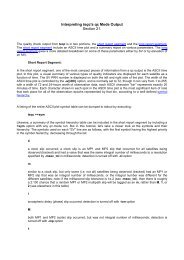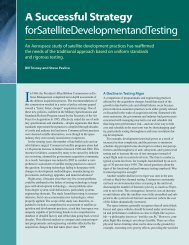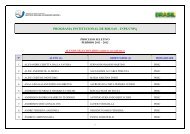Living with Risk. A global review of disaster reduction initiatives
Living with Risk. A global review of disaster reduction initiatives
Living with Risk. A global review of disaster reduction initiatives
You also want an ePaper? Increase the reach of your titles
YUMPU automatically turns print PDFs into web optimized ePapers that Google loves.
4<br />
<strong>Living</strong> <strong>with</strong> <strong>Risk</strong>: A <strong>global</strong> <strong>review</strong> <strong>of</strong> <strong>disaster</strong> <strong>reduction</strong> <strong>initiatives</strong><br />
156<br />
Limitations<br />
The exponential growth in the volume <strong>of</strong><br />
sources and data also poses continuing challe<br />
nges for the processing and dissemination <strong>of</strong><br />
meaningful information. Users find it ever<br />
harder to assess the accuracy, veracity, and in<br />
some cases, the validity <strong>of</strong> the content. While<br />
systematic gathering and timely provision <strong>of</strong><br />
information are keys to ensuring the effective<br />
use <strong>of</strong> information, processes <strong>of</strong> sorting,<br />
analysing and targeting information for primary<br />
interest groups are at least as important to<br />
avoid information overload and confusion<br />
among users.<br />
Moreover, there is a growing tendency for<br />
many information providers to rely on increasingly<br />
sophisticated means <strong>of</strong> electronic communication,<br />
thereby excluding many potential<br />
Lack <strong>of</strong> information-or lack <strong>of</strong> access?<br />
As conveyed in the regional ISDR report which took<br />
account <strong>of</strong> conditions in Southern Africa, but which no<br />
doubt apply elsewhere, there are many countries in<br />
which a wealth <strong>of</strong> <strong>disaster</strong> risk information exists in<br />
archived form: hydrometeorological data, early land-use<br />
records, historical natural resource conditions, water<br />
records and related issues. Such information might be<br />
recorded in an unsuitable form, or more seriously, might<br />
not be readily accessible because <strong>of</strong> restricted institutional<br />
or technical reasons. These might include conditions<br />
in which,<br />
• Data is retained or restricted under presumed security<br />
considerations, or as an institutional power<br />
base;<br />
• Inadequate cross-sectoral reference or communication<br />
about the existence <strong>of</strong> data so that other potential<br />
users are not aware <strong>of</strong> the information;<br />
• Compilation and dissemination <strong>of</strong> information are<br />
not considered a priority by organizations;<br />
• Information is maintained in specialist, non-standard,<br />
incompatible or even archaic formats;<br />
• Information that exists in spatial or other formats<br />
can be costly to convert into more readily accessible<br />
formats;<br />
• Data compilers might not have consulted potential<br />
users about their respective data requirements so<br />
available data are not structured to easily address<br />
the needs <strong>of</strong> either current or subsequent users.<br />
users that live in impoverished areas. While<br />
some institutions have been hesitant to adapt to<br />
new forms <strong>of</strong> communication and technologies,<br />
many others now rely on electronic communications<br />
or web site access for information that<br />
is <strong>of</strong>ten beyond the reach <strong>of</strong> the people most<br />
vulnerable to <strong>disaster</strong>s.<br />
Several factors have hindered the development<br />
<strong>of</strong> efficient information systems for general use,<br />
while other constraints might be more institutional<br />
in nature. Several commentators in Africa<br />
have conveyed to the ISDR secretariat their<br />
view that the provision <strong>of</strong> timely, definitive<br />
information remains problematic throughout<br />
all aspects <strong>of</strong> <strong>disaster</strong> management responsibilities.<br />
A response from Bangladesh to an ISDR<br />
survey on the status <strong>of</strong> <strong>disaster</strong> <strong>reduction</strong> shared<br />
a common concern voiced by other countries as<br />
well. Their concern results from the fact that<br />
various government agencies, international<br />
organizations, technical organizations or academic<br />
institutions, as well as NGOs, all produce<br />
data and information relevant to <strong>disaster</strong><br />
risk management processes. The need <strong>of</strong> individual<br />
organizations or external donor agencies<br />
to have adequate information for their own programme<br />
interests has motivated most agencies<br />
to develop information systems that cannot easily<br />
be applied to other settings.<br />
While many <strong>of</strong> them are involved in various<br />
projects concerned <strong>with</strong> hazard and risk issues<br />
or land-use planning, no commonly acknowledged<br />
focal point exists to provide easy or consistent<br />
access to such information. As a consequence,<br />
important data or information related<br />
to risk maps, or associated public awareness<br />
and education programmes about hazards,<br />
might either be scattered or confined among<br />
libraries, individual government <strong>of</strong>fices, academia<br />
or individual technical programmes <strong>with</strong><br />
no common point <strong>of</strong> access.<br />
An appreciation <strong>of</strong> <strong>initiatives</strong><br />
around the world<br />
There are numerous examples that illustrate<br />
how information management, innovative<br />
communication practices about hazards and<br />
various pr<strong>of</strong>essional <strong>initiatives</strong> associated <strong>with</strong><br />
<strong>disaster</strong> issues, have helped to advance public<br />
understanding and pr<strong>of</strong>essional involvement in<br />
<strong>disaster</strong> risk <strong>reduction</strong> in recent years.



